“The visit of Pope Francis to Hungary strengthens us in the indescribable gift of God, Jesus Christ, in our Christian faith, culture, order and Christian ministry,” said József Steinbach, reformed Bishop of Transdanubian Church District and President of the Ecumenical Council of Churches in Hungary (ECCH), on Sunday at the Museum of Fine Arts, where Pope Francis met with representatives of the ECCH and the Jewish communities.
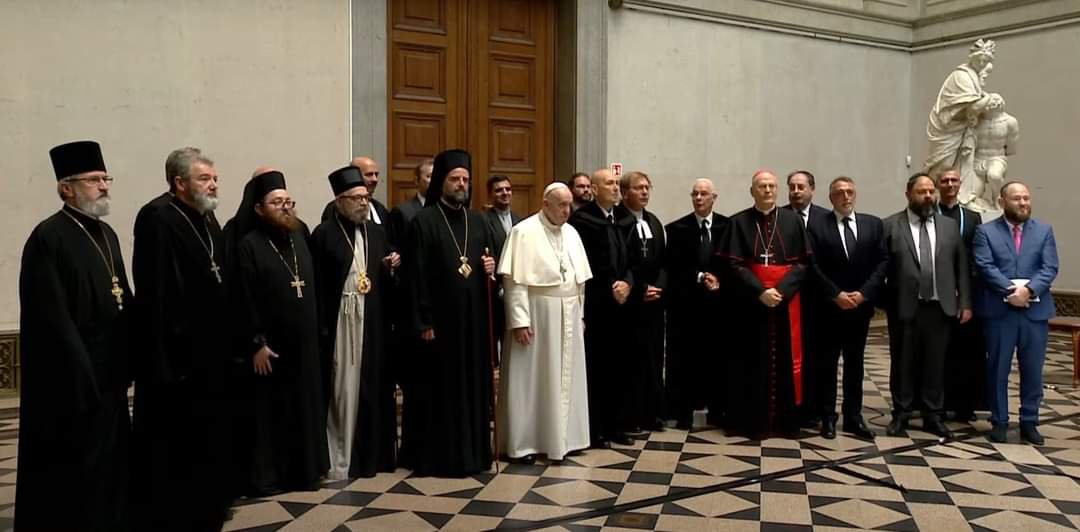
Delegates of the Ecumenical Council and the Jewish Communities meet Pope Francis
Pope Francis arrived in Budapest to attend the concluding Mass of the 52nd International Eucharistic Congress. The so-called statio orbis, or Holy Mass for the city and the world, a liturgy manifesting the unity of the whole Church around the table of the Lord, and closing the Congress, is traditionally the most solemn event of the series of Catholic events. Before the Mass, the Head of the Catholic Church also met the delegation of the Ecumenical Council of Churches in Hungary.
At the meeting, Pope Francis emphasized that instead of isolation and partial interests, there is a need for people and communities who build bridges of unity, respecting the freedom of religion of all. The Pope also called for united efforts against anti-Semitism.
In the Marble Hall of the Museum of Fine Arts, Pope Francis quoted Miklós Radnóti and Rainer Maria Rilke. The Pope said that we must help our contemporaries to "accept and love each other”. “Only if we become roots of peace and shoots of unity, will we prove credible in the eyes of the world, which look to us with a yearning that can bring hope to blossom”.
Video Report about the meeting
The Symbol of the Chain Bridge
Pope Francis then asked all those present to reflect on “the evocative image of the Chain Bridge connecting the two halves of this city”. He noted that the bridge does not fuse those two parts together, but rather holds them together. “That is how it should be with us too”, said the Pope. He explained that “whenever we were tempted to absorb the other, we were tearing down instead of building up”. This, he noted, has happened often throughout history. “We must be vigilant and pray that it never happens again”, he said, “and commit ourselves to fostering together an education in fraternity, so that the outbursts of hatred that would destroy that fraternity will never prevail”. Thinking of the threat of antisemitism, the Pope stressed, “this is a fuse that must not be allowed to burn”. The Pope went on to note that the bridge has yet another lesson to teach us. “It is supported by great chains made up of many rings. We are those rings, and each of us is essential to the chain. We can no longer live apart, without making an effort to know one another, prey to suspicion and conflict”, said the Pope, adding “a bridge unites”.
Read the full report of the Vatikan News about the meeting.
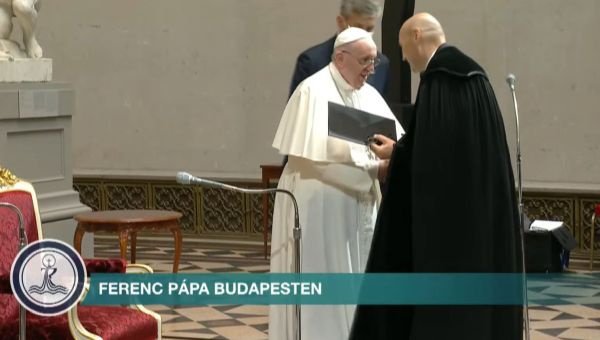
Pope Francis and Bishop Steinbach, President of ECCH
In welcoming Pope Francis, Bishop József Steinbach, President of the Ecumenical Council, said that the visit of the Head of the worldwide Catholic Church to Hungary "strengthens us in the indescribable gift of God, in Jesus Christ, in our Christian faith, culture and Christian ministry".
On behalf of the member churches of the ECCH, the Reformed Bishop asked for "strength and blessing from above" upon Pope Francis' life and ministry, and for "our common Christian witness and joint ministries, which the world is waiting for".
Pope Francis received a facsimile edition of the Bible of Vizsoly as a gift. The Vizsoly Bible, also called Károli Bible was the first Bible printed in the Hungarian language. It was translated in the 16th century by pastor Gáspár Károli and fellow Calvinists and was printed in 1590. A copy is kept on permanent display in the Hungarian village of Vizsoly.
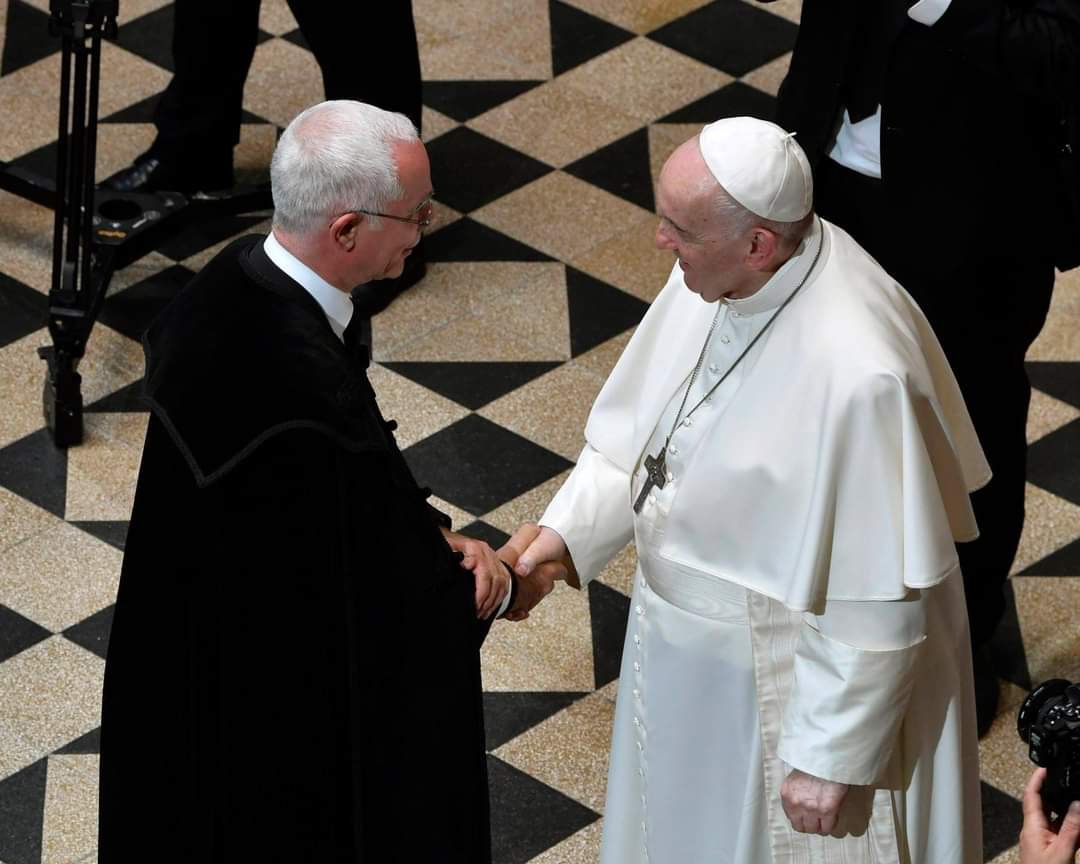
Pope Francis and Bishop Zoltán Balog
The delegation of the ECCH included, among others, Bishop Zoltán Balog, Ministerial President of the Synod of RCH, József Steinbach, Bishop of the Transdanubian Reformed Church District, András Gér, General Secretary of RCH, Dr. Tamás Fabiny, Presiding Bishop of the Evangelical-Lutheran Church in Hungary, Péter Kondor, Lutheran Bishop and Vice-President of ECCH, János Papp, President of the Baptist Church in Hungary, Albert Pataky, President of the Hungarian Pentecostal Church, Vilmos Fischl, General Secretary of ECCH, and representatives of the Methodist, Anglican and Orthodox Churches in Hungary. The Jewish organisations in Hungary were represented by András Heisler, President of the Federation of Hungarian Jewish Communities, Zoltán Radnóti, Chief Rabbi, and Gergő Guba and Gábor Kálmán Guba of the Sim Shalom Reform Jewish congregation.
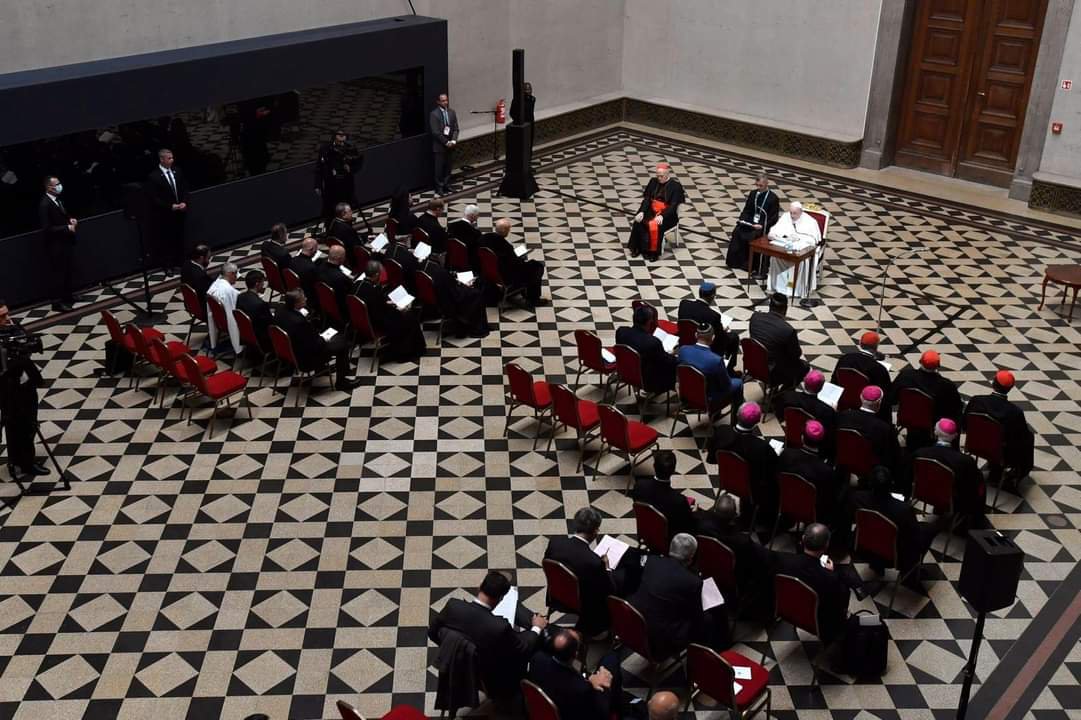
Words of greetings by Bishop József Steinbach, President of the Ecumenical Council of Churches in Hungary
It is with great respect, I welcome His Holiness Pope Francis to Hungary. I do so on behalf of the twelve member churches of the Ecumenical Council of Churches in Hungary. It is a joy for us, Christians in Hungary, that the International Eucharistic Congress has taken place in Hungary.
The Eucharist - which also includes the term "Charis" - grace and joy - means thanksgiving. Its essence can be most succinctly summarized with the words of Apostol Paul: "Thanks be to God for his indescribable gift!" (2Cor. 9:15)
Indeed, thanks be to God for His indescribable gift, the risen Jesus Christ, who is the promise in the Old Testament and the fulfilment in the New Testament, who died and rose again, who promised the ultimate hope, the restoration of all things. Thanks be to God for his love that saves and redeems the world and mankind.
Through faith, we experience that in Jesus Christ, in the fellowship with the risen Lord through the Holy Spirit, the fullness of the "beyond" fills the "within", every moment of our earthly life. Every Eucharist, every thanksgiving, is in fact a concrete thanksgiving before God for God's one gift, indescribable and beyond comprehension to the human mind, the redeeming Jesus Christ; gratitude for the love with which God so loved this world that He gave His only begotten Son, that whoever believes in Him should not perish but have everlasting life.
This gift obliges us to mutually share this divine love with one another, to take care of one another, to cherish life and God's order of creation, to protect the earth we live in, to pray and act for one another, to live meaningful and good lives where all human life can flourish in fullness; to the glory of God and for the benefit of our neighbours.
The visit of His Holiness Pope Francis to Hungary strengthens us in God's indescribable gift of Jesus Christ, in our Christian faith, culture, order and in our Christian ministry.
On behalf of the member churches of the Ecumenical Council of Churches in Hungary, we ask for strength and blessing from above upon the life and ministries of His Holiness Pope Francis, and for our common Christian witness and service, for which the world is waiting.
The Concluding Mass of the International Eucharistic Congress
Thousands of pilgrims from Hungary and worldwide remembered Jesus Christ giving Himself in the Holy Eucharist to His disciples during the Passover meal before his crucifixion and resurrection on Easter Day. With the 52nd International Eucharistic Congress in Budapest, cardinals, bishops, and other delegates want to send a message of hope to a world in turmoil amid a covid pandemic, wars, and uncertainty.
Jesus’ question to His disciples in Sunday’s Gospel — “Who do you say that I am?” — is addressed to each one of us personally, Pope Francis said in his homily at the concluding Mass for the 52nd International Eucharistic Congress. It is a question, he said, that “calls for more than a quick answer straight out of the catechism.” Instead, “it requires a vital personal response.” The Holy Father said that our response “renews us as disciples,” a renewal that involves three steps: proclaiming Jesus, discerning with Jesus, and following Jesus… Pope Frances repeated, “Walking behind Jesus means always looking ahead, welcoming the kairos of grace, and being challenged each day by the Lord’s question to us, his disciples: Who do you say that I am?”
reformatus.hu/MTI/refdunantul.hu/vaticannews.va
Heroes Among Us - A Gift to Pope Francis
Pope Francis received among others a volume published with the professional contribution of the Committee of National Remembrance. The publication contains 50 true personal stories of "brave Hungarians", among them reformed pastors, who were ready to suffer for their faith and convictions.
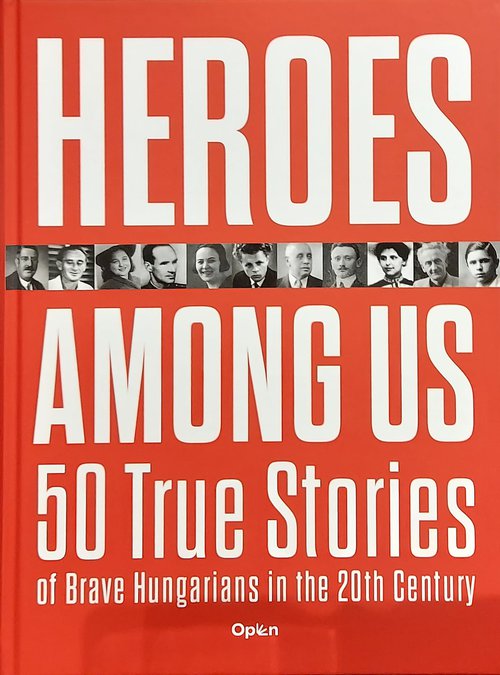
"In the late 1930s, as it became increasingly clear that Europe was about to be plunged into war again for the second time in the space of only a few decades, Hungary, nestled among the states of Central Europe, found itself at the collision of the two most destructive ideologies of the past century. While the names of the willing collaborators of either Nazi Germany or Stalin and his henchmen have been rightfully recorded in the history books, the names of those who took a stand against injustice and inhumanity under any flag have perhaps at times been too hastily overlooked. Often far from the hallowed halls where statesmen made the momentous decisions which shaped the course of history, ordinary people put their own lives at grave risk by daring to defy the totalitarian regimes. These were people from almost all walks of life, including church figures, scientists, mechanics, teachers, students, and some of them defied both those politicians who insisted on fighting on Nazi-Germany's side during the Second World War and the communist forces which seized control of the country in its wake. Their lives and their sacrifices offer eloquent testimony to the power of the individual to take a stand against totalitarianism.
This book, which includes a rich array of photographs from the time, is intended as a tribute to these heroes, their courage and defiance in the face of tyranny. Let it remind us that, while many of these brave souls paid the ultimate price for their shows of fortitude, the regimes against which they fought have since fallen, and these everyday heroes have emerged as the victors."
(Open Books, 2021)